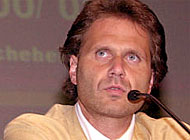
Basel theatre supports director with Stasi past

The board of directors of one of Switzerland's leading cultural institutions, the Basel Theatre, is resisting calls to dismiss the theatre's director, after he revealed he was a former spy of the East German state security police, the Stasi.
The theatre’s board of directors said that both they and the staff are firmly behind Michael Schindhelm. The statement comes after Schindhelm, 40, from Germany, outed himself as a member of the Stasi last week.
Schindhelm has been the theatre’s director since 1996. He revealed his past in a long written statement to the German weekly newspaper “Die Zeit” and the local “Basler Zeitung”. In the text, Schindhelm described himself more as a victim than a Stasi collaborator.
In the statement and in subsequent interviews, Schindhelm explained that he was blackmailed by Stasi agents while a student in the Russian city of Voronezh in 1984. He said the agents pressured him into signing up as an informer by threatening to expose his contacts with students from capitalist countries, a crime under GDR law.
Schindhelm says nobody was harmed because of his activities. He says that when he informed the Stasi on some of his friends he always kept them fully informed too, a common subversion of involuntary spying known among critics of the socialist dictatorship at the time as “de-conspiring”.
The Swiss press has accused Schindhelm of remaining silent for too long. The Zurich-based Tages-Anzeiger went so far as to call for his dismissal.
“I don’t care whether he was an informer or not,” says the veteran theatre critic Reinhardt Stumm. “But theatre is an institution that has to do with truth. How can it carry on its work, being paid by the public, if it doesn’t stick to its own principles?”
The board of directors of the Basel theatre, as well as the government of the canton of Basel which subsidises it, have so far stood behind Schindhelm. “It would be wrong if his Stasi past were to ruin his career for a second time,” says Andreas Spillmann, head of the cantonal cultural affairs department.
According to press reports, Schindhelm informed the president of the board of directors, Walter von Wartburg, at the time of his employment in 1996 that a Stasi file on him existed. But von Wartburg didn’t reveal what of Schindhelm’s past he did or did not know.
Schindhelm defended his late admission by saying that he tried in vain to find his file in the archives of the German Federal Commissioner for the State Security Service of the former GDR in the early 1990s when the archives were opened to the public.
“Nobody would have believed me if I had told my story then without being able to back it up,” he explained.
But critics have questioned his motives. They say Schindhelm, who in 1999 was in the running to direct the Deutsche Oper in Berlin, decided to lay open his past when he learned that German journalists had begun to investigate his 260-page file, which bears the code name of “Manfred Weih”.
Critics say the Basel theatre public had a right to feel betrayed, especially since Schindhelm has spoken and written extensively about his GDR past. Last year he published “Roberts Reise”(“Robert’s travels”) – a novel that is easily recognisable as a biographical account.
In the book, Schindhelm describes his days in Voronezh, where he studied quantum chemistry. He writes about his relationship with an Italian woman student and his general behaviour, which was unruly by socialist standards in many ways.
Being haunted and interviewed by Stasi agents also features in the book, albeit with a different outcome: Robert, Schindhelm’s other self, manages to outwit the agents in the story, which the author may have called a novel precisely for that deviation from the truth.
In 1986, Schindhelm gave up his post at the elite Academy of Sciences in Berlin in order to escape harassment by the Stasi. Shortly before the fall of the Berlin Wall in 1989, he became theatre director in the provincial town of Gera in the GDR.
Schindhelm’s credentials as theatre director in Basel are mixed. Under his reign, theatre critics elected Basel playhouse of the year of the German-speaking world in 1999.
On the other hand, the Basel theatre, which includes theatre and opera, has lost a considerable share of its audience in the past year and has been playing to an average capacity of just over 50 per cent this season.
by Markus Haefliger

In compliance with the JTI standards
More: SWI swissinfo.ch certified by the Journalism Trust Initiative






























You can find an overview of ongoing debates with our journalists here . Please join us!
If you want to start a conversation about a topic raised in this article or want to report factual errors, email us at english@swissinfo.ch.